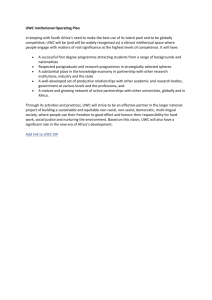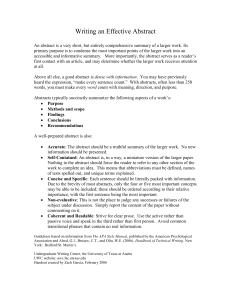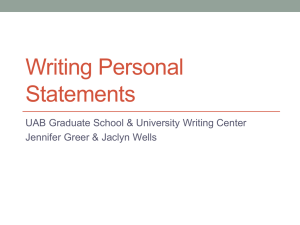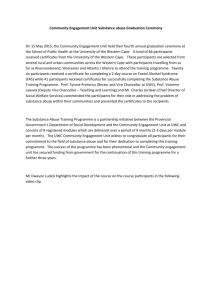The University Writing Center is Making Moves The Magic Numbers
advertisement
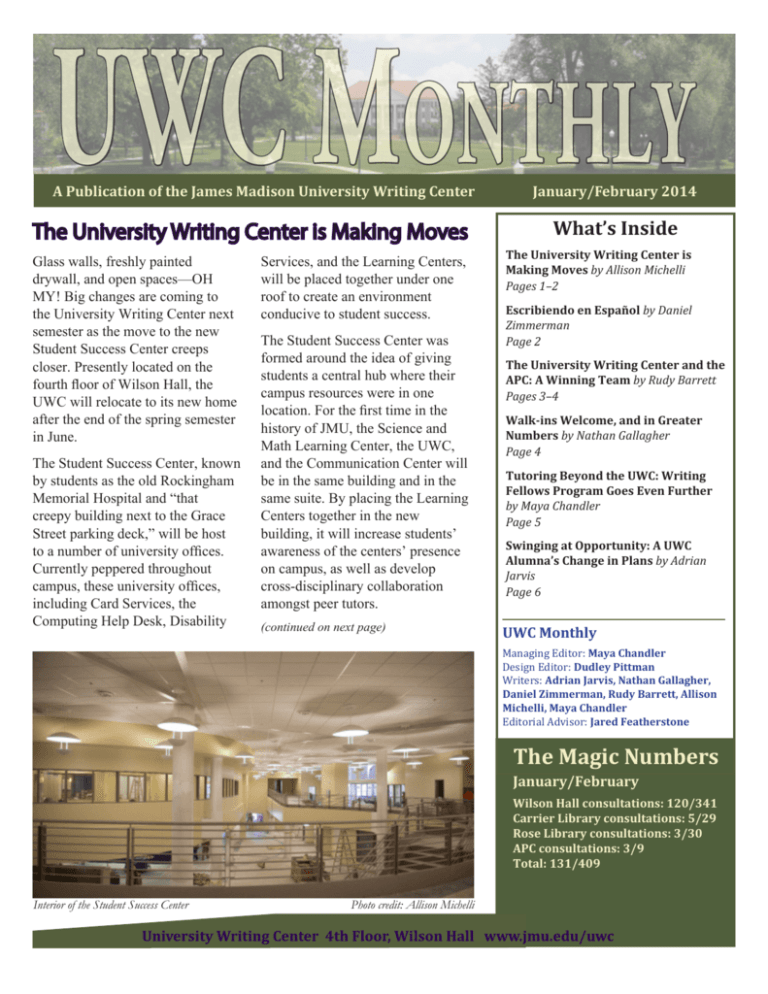
UWC Monthly A Publication of the James Madison University Writing Center The University Writing Center is Making Moves Glass walls, freshly painted drywall, and open spaces—OH MY! Big changes are coming to the University Writing Center next semester as the move to the new Student Success Center creeps closer. Presently located on the fourth floor of Wilson Hall, the UWC will relocate to its new home after the end of the spring semester in June. The Student Success Center, known by students as the old Rockingham Memorial Hospital and “that creepy building next to the Grace Street parking deck,” will be host to a number of university offices. Currently peppered throughout campus, these university offices, including Card Services, the Computing Help Desk, Disability Services, and the Learning Centers, will be placed together under one roof to create an environment conducive to student success. The Student Success Center was formed around the idea of giving students a central hub where their campus resources were in one location. For the first time in the history of JMU, the Science and Math Learning Center, the UWC, and the Communication Center will be in the same building and in the same suite. By placing the Learning Centers together in the new building, it will increase students’ awareness of the centers’ presence on campus, as well as develop cross-disciplinary collaboration amongst peer tutors. (continued on next page) January/February 2014 What’s Inside The University Writing Center is Making Moves by Allison Michelli Pages 1–2 Escribiendo en Español by Daniel Zimmerman Page 2 The University Writing Center and the APC: A Winning Team by Rudy Barrett Pages 3–4 Walk-ins Welcome, and in Greater Numbers by Nathan Gallagher Page 4 Tutoring Beyond the UWC: Writing Fellows Program Goes Even Further by Maya Chandler Page 5 Swinging at Opportunity: A UWC Alumna’s Change in Plans by Adrian Jarvis Page 6 UWC Monthly Managing Editor: Maya Chandler Design Editor: Dudley Pittman Writers: Adrian Jarvis, Nathan Gallagher, Daniel Zimmerman, Rudy Barrett, Allison Michelli, Maya Chandler Editorial Advisor: Jared Featherstone The Magic Numbers January/February Wilson Hall consultations: 120/341 Carrier Library consultations: 5/29 Rose Library consultations: 3/30 APC consultations: 3/9 Total: 131/409 Interior of the Student Success Center Photo credit: Allison Michelli University Writing Center 4th Floor, Wilson Hall www.jmu.edu/uwc Page 2 The new facilities for the Learning Centers will consist of open café-style seating with tables and chairs where students and tutors will work. According to Kurt Schick, the Director of the JMU Learning Centers, the UWC has taken “a leadership role in the discipline of writing centers,” and the new space will be “one of the most impressive writing center spaces in the country.” UWC Coordinator Jared Featherstone, when asked what his biggest hopes for the new center are, stated that “it will enable us to help more students and faculty in this university community. In Wilson Hall, we are tucked away in the attic, but the new space will give us significant visibility on campus. With the flexible and innovative design of the new space, we will also have the opportunity to expand our services to provide help to those we aren’t currently seeing at the center. This is going to be an exciting new era in the evolution of the University Writing Center.” The new facilities and rising reputation in the writing center world puts the UWC in the perfect position to possibly host the Mid-Atlantic Writing Center Association Conference next spring and to share expertise with other universities at MAWCA and other conferences nationwide. -Allison Michelli, Peer Tutor Escribiendo en Español The University Writing Center initiated a new service this semester: tutoring for essays composed in Spanish— by students with Foreign Language majors or minors. According to tutor Kellie Harlow, a Modern Foreign Language major with a minor in Business Spanish, this new service turns the UWC from a “monolingual community into a multilingual community,” giving the center a dimension that allows it to aid more students in multiple ways. Reading aloud helps to catch awkward wording or poor grammar, but it is much more difficult to catch these problematic phrases in a language where neither the tutor nor the client feels completely comfortable. These difficulties are not insurmountable, but they add another layer of complexity to a tutoring session because both the tutor and the client must negotiate an unfamiliar linguistic structure (which often entails different logical and linguistic conventions). The service began when Mary O’Donnell, an assistant professor of Spanish at JMU, approached UWC Coordinator Jared Featherstone and suggested that her students, and their Spanish essays, could benefit from tutoring. Featherstone chose Kellie Harlow and Kristin Gatti, who has a Spanish minor on top of her SMAD and WRTC double major, to be the first two tutors to pilot this service. So far, relatively few students have taken advantage of the service. Undoubtedly, many students simply do not know that the UWC now offers Spanish essay tutoring, but the UWC’s media and marketing team are working on new advertisements to increase student exposure to the program. Gatti notes that these tutoring sessions are quite similar to tutoring sessions for papers composed in English; her first priority with both is to address global concerns such as structure or organization before grammatical or punctuation problems. However, because both she and the client are non-native speakers, simple tasks such as reading the paper aloud can become a source of discomfort and reservation to the student. This new field of tutoring adds a multidisciplinary breadth to the UWC, and hopes are high that the service will grow exponentially as it gains recognition on campus. -Daniel Zimmerman, Graduate Assistant University Writing Center 4th Floor, Wilson Hall www.jmu.edu/uwc Page 3 The University Writing Center and the APC: A Winning Team The harsh stereotypes about student athletes are pervasive. We’ve all heard them: “Athletes aren’t devoted students,” “They don’t try,” and of course the notion that “They won’t want tutors to help them write a paper—they just want you to write it for them.” As a peer tutor at the Athletic Performance Center (APC), I am continually pleased to see these generalizations proven false. These stereotypes can sometimes cause student athletes to discredit their academic skills without giving themselves a chance, but this is where the UWC steps in. Early on in my time tutoring at the APC, a tutee confessed to me that he had a hard time starting his paper because he wasn’t sure what paraphrasing meant, and that he had gotten teased when he asked other classmates for help. He felt unfairly labeled as a “dumb jock” simply because of his unfamiliarity with the term. However, when we began talking about the idea of paraphrasing, the tutee showed great aptitude. His efforts proved to me that no matter what the stereotypes say, these athletes aren’t any less devoted than non-athlete students. All he needed was some one-on-one time with a tutor to help build his confidence and work through writing-related questions. Erik Simmons, a fellow APC tutor, has also seen the negative stereotypes proved wrong by the students that frequent the APC tutoring sessions. He says, “These athletes are unfathomably busy, which results in high levels of stress, sometimes little preparation, and other roadblocks.” Their busy schedules make quick, effective tutoring a priority, which is provided in the half-hour sessions at the APC. There, tutors can take away some of the intimidating factors from the writing task by working through a prompt or getting around writer’s block to save the students’ muchneeded free time. Because many return as repeat clients, it is easy to see how often they internalize advice and how hard they work to improve. Simmons corroborates, saying, “It’s [the] mentality that improvement is based on effort. Almost all of [the athletes I’ve tutored] believe they can get where they want to go in their education with a little push.” Part of being a student athlete is being able to rely on others and operate well on a team. Simmons says, “Everyone knows each other in the APC, and in that little film room you’re bound to be interrupted numerous times by other athletes who want to talk or just say hi.” The value of camaraderie is crucial in the APC. “We build relationships with these tutees,” Simmons continues. “It has been The APC, home to many resources for athletes including UWC tutoring (continued on next page) Page 4 vital for us to develop bonds that make them feel as if they always have a friend…who will not judge them.” This focus on rapport-building is what makes all UWC sessions productive and friendly, and it is very much at home in the team-based APC community. As the APC tutoring sign says, “Writing takes practice too”—and that is paramount. Just like any other skill, training and encouragement are required to promote writing and I’m happy to be an enthusiastic helper encouraging students to practice and develop good writing habits. If a student feels oppressed by their standing in a class or intimidated by an upcoming paper, the writing tutors at the APC will provide instruction and encouragement—and the athletes, well known for this skill, will apply their diligence and determination. It is most definitely a winning combination. I’m very proud to be an APC tutor; the student athletes are amazing, the sessions are consistently productive and engaging, and I know I’m bringing writing tutorship to a subset of the JMU population that will greatly benefit from and appreciate the help. -Rudy Barrett, Peer Tutor Walk-ins Welcome, and in Greater Numbers Even though essays are often assigned weeks in advance, most students don’t begin writing them until much closer to the deadline. When students start to panic about their papers, they come to the University Writing Center. However, some students have never been to the UWC, or are not aware that an appointment can be made ahead of time. They simply show up, hoping for the best. This is a scenario that JMU’s Writing Center has seen many times before. In years past, only a few tutors were designated for walk-in appointments. Because this is an appealing option to the last-minute writer, the Writing Center has shifted more attention to this type of appointment and clientele. “In the past, it’s seemed like walk-ins were a supplemental thing to appointments, but this semester it seems pretty equal as far as the importance of walk-ins versus appointments,” says Drew Watt, a third-semester tutor and seasoned walk-in veteran. Jared Featherstone, the UWC Coordinator, says, “The walk-in hours are more flexible, in terms of session length, allowing more students to get help during a given shift.” With walk-in appointments, the sessions can vary in length, which allows tutors to see more students than they could with scheduled appointments. UWC tutor Haris Ghayas greets a walk-in tutee Photo credit: Nathan Gallagher service, but also as a response to next semester’s new building by saying, “Our new space…will have a lot more walk-through traffic because of all the other neighboring services. It’s likely we’ll have a lot more students just showing up for writing help, unannounced. We need to adapt our services to fit the needs of this new space.” It seems that both the physical move and the shift in tutoring style is a change for the better, and in classic UWC style, it keeps the students in mind. -Nathan Gallagher, Peer Tutor Featherstone explains his decision to increase the walk-in appointments as not only an expansion of this popular University Writing Center 4th Floor, Wilson Hall www.jmu.edu/uwc Page 5 Tutoring Beyond the UWC: Writing Fellows Program Goes Even Further Teachers “just don’t understand.” It’s the age-old complaint of students everywhere. But at the UWC, both peer tutors and faculty work to get around this frustration and soften the imaginary gap between writer and professor. One part of the UWC that targets this problem is the Writing Fellows program. Peer Education Coordinator and head of the Writing Fellows program Laura Schubert explains it simply: the service provides “course-embedded tutoring.” And while the Writing Fellows program is no new addition to the UWC’s wide array of services, it is among the many that are expanding to help an even larger portion of JMU’s students. Since its beginning in 2010 within a WRTC course, the program has continually served the humanities. This semester, though, the Writing Fellows program is branching out. Schubert explains the growth, saying, “We were very intentional about trying to expand [the program].” This semester, Schubert and Learning Centers Director Kurt Shick have helped the program enter four new departments and six new classes. Along with their traditional participation in GWRTC courses, peer tutors are working in the “east campus” disciplines of Engineering, Biology, Nursing, and ISAT. While the jump into an unfamiliar field may seem immense, the peer tutors in these roles meet the challenges with optimism. Erik Simmons, a peer tutor partnering with a Social Work capstone course, says, “This is exciting because it’s a new venue of tutoring for me.” It’s new not only because of the unfamiliar topic, but also because the tutoring style is very different from a one-on-one session. “My role is important because my impact could have an effect on the future of these students,” Simmons also says. As a fellow, his availability to the students can influence their writing skills in ways that a single session could not, and his correspondence with the professor can influence the way they look at both writing assignments and their students. Peer Tutor Chris Deitrick, who is a fellow for an Introduction to Engineering class, was a part of the Writing Fellows program last semester as well. He notes the “universal” nature of his role, and finds himself working on topics that are “emphasized across all departments,” saying that despite the change in classroom settings, his “responsibilities as a fellow are largely unchanged.” He concludes by saying, “My second experience as a fellow has revealed the importance and similarities of writing across disciplines, and it should stand to emphasize the benefit professors can share from inviting peer tutors into the classroom.” In the past, the Writing Fellows program has been highly successful, with both students and professors wanting more. The UWC looks forward to the future of the program, and the exposure it provides for the Writing Center’s services to students—no matter what field they are in. -Maya Chandler, Peer Tutor Page 6 Swinging at Opportunity: A UWC Alumna’s Change in Plans In the spring of 2013, UWC alumna Camille Corum graduated with a specific plan for her future, as many of her peers did. For Corum, that plan was to go into publishing and the editorial field. After interning with a publishing company in New York for two summers, she was told that upon graduating, there would be a job waiting for her. So with her degree in both English and WRTC in hand, Corum was ready to get to work. But her best-laid plans had one important fault. “It turned out the job wasn’t available to me after I graduated,” she says, “so I was scrambling. I had put all of my eggs in one basket.” All at once, her plans to move to New York were put on an indefinite hold. Despite her discouragement, she kept searching for a job that would utilize her experience in writing. “I had to look outside my very focused career path,” Corum remembers, and after a short time, she learned about a marketing job in Chicago. “When I was offered the interview in Chicago, I took it and never looked back.” The interview went well and Corum was offered the job with Harrison Street Software, a talent management software company in Marketing Communications—a field she never would have expected. She creates marketing collateral like tear sheets and promotional videos for companies interested in doing business with Harrison Street Software. “It’s challenging and daunting, but I feel so lucky. They give me a lot of responsibility and I show them what I can do,” she says. She encourages all graduating seniors looking for work to take chances and to be ready for plans to fall apart, saying, “You’re not going to establish yourself and make a career if you don’t take a risk. It helps to aim, but you’ll never hit the ball if you don’t swing.” Camille Corum in Chicago Corum expressed a great deal of gratitude toward the directors and peer employees of the Writing Center, where she was employed since the spring of 2011 until her graduation. Her transition into the working world came easily, as she had grown comfortable with professional conduct during her years at the UWC. “We have responsibility and accountability for our actions; we have to be professional,” Corum says of peer tutors. “The directors at the UWC really stressed professional skills and working closely in groups, and I valued that a lot.” But Corum’s time at the Writing Center did more than just increase her professionalism. “The atmosphere of the Writing Center was great,” she recalls. “If we had a question we could ask anybody. We might not have known each other, but it was a friendly environment.” She says that environment helped her to treat her work setting with the same group-oriented communication and that she loves to “take the initiative to learn and work with other people.” Even in her excitement to start work for Harrison Street Software, she has not forgotten her love of tutoring. She currently tutors inner-city children from Chicago in her spare time. To her fellow tutors, especially those in their last years, Corum says, “Keep tutoring. We have the experience, we have the skills. It’s important to keep it up if you can.” -Adrian Jarvis, Peer Tutor University Writing Center 4th Floor, Wilson Hall www.jmu.edu/uwc Page 7 University Writing Center www.jmu.edu/uwc The University Writing Center offers: • Free, individualized writing help for all students and faculty • In-class workshops on a variety of writing topics • Hundreds of writing links collected on the UWC website Locations and Hours • Wilson Hall: Monday–Thursday, 9 a.m.–5 p.m., and Friday, 9 a.m.–12 p.m. • Carrier Library: Monday and Wednesday, 7–10 p.m. • East Campus Library: Monday and Wednesday, 7–10 p.m. University Writing Center MSC 1007 951 Madison Drive Wilson Hall, Room 417 Harrisonburg, VA 22807 540.568.6967 Phone 540. 568.3450 Fax feathejj@jmu.edu www.jmu.edu/uwc
